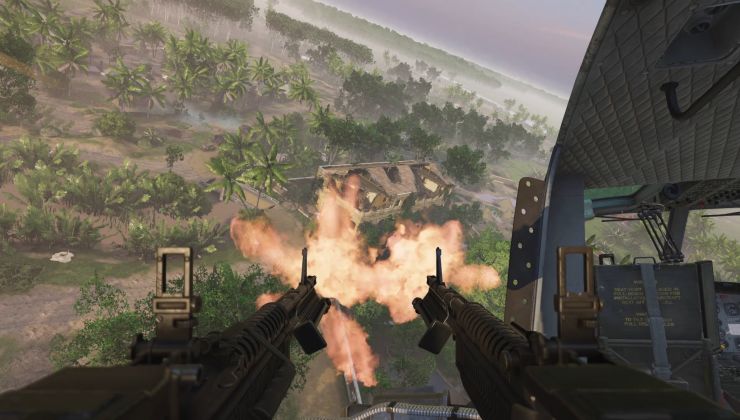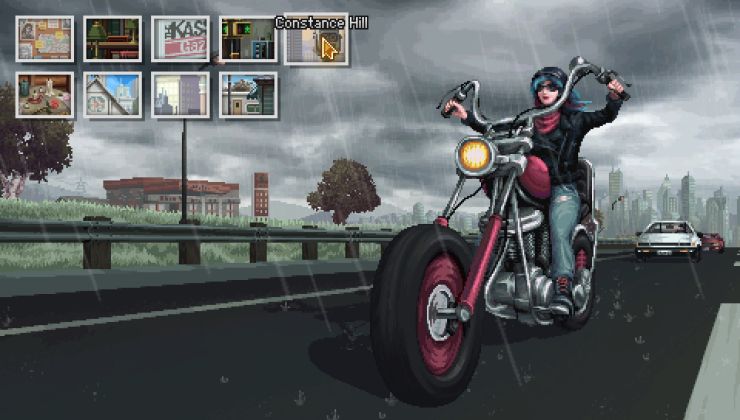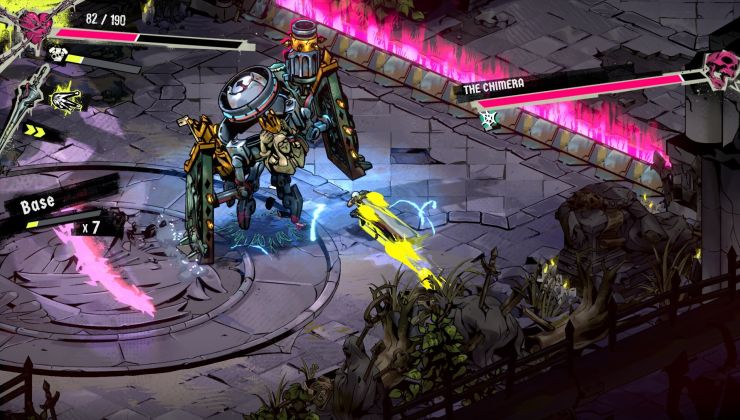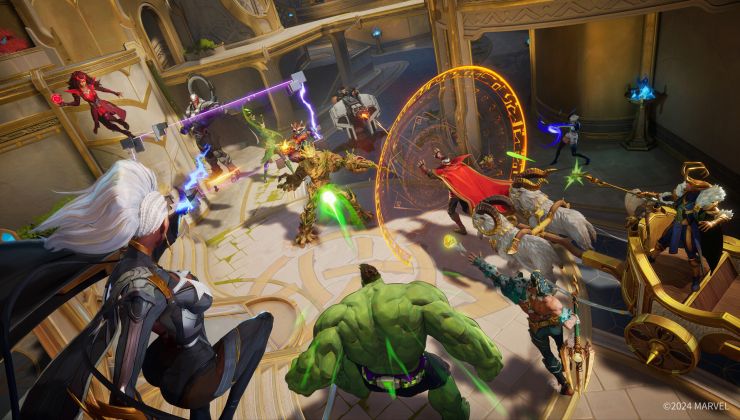Now that the Atari VCS is out in the wild for plenty of IndieGoGo backers, we've seen plenty of reports of how it works and one GamingOnLinux reader gave us plenty of info.
Currently, it seems like the whole thing is still in something of a Beta stage. The software seems a little on the buggy side, and there's still not much in the way of games available for it. However, it actually does sound like a reasonable good little device - which I am sure will surprise plenty of naysayers.
User slaapliedje in our Forum has been going through details including how, yes, you really can load a plain Linux distribution up with Debian Buster tested working (once you do a couple small tweaks). All very interesting but even more so is how their own Atari World OS is clearly a normal Linux distribution with a fancy console interface on top.
 Pictured: Atari 5200, 7800 and the Jaguar+CD with the Atari VCS - credit to slaapliedje
Pictured: Atari 5200, 7800 and the Jaguar+CD with the Atari VCS - credit to slaapliedje
Very interesting to know just how close the VCS really is to a traditional Linux box. I thought they would have customized it more, but they appear to have stuck to what they originally said about keeping it reasonably open to the point of not even protecting the games you get on it. In an email to us, user slaapliedje mentioned how they've been able to move games on their Atari VCS over to an external drive, and then launch those games on their normal Linux desktop.
You can connect another drive to it (I am currently using a Samsung USB 3 SSD drive) and hit ESC on a keyboard, boot to USB. I installed Debian on it, which you have to use a distro that has signed keys for secure boot (so my attempt with GamerOS failed). But with the drive connected, you can copy the games from within AtariOS to other storage.
Keeping in mind this is the backer release, not the retail release, they still have time to fix up lingering issues.
The Xbox One is just a desktop Windows machine with a fancy console interface and mandatory cryptographic signatures for all executables. The PS4 is just a regular BSD with a fancy console interface and similar restrictions. Why should the Atari VCS be much different?
Not surprising.The point is it's another piece of hardware out there, that is super close to Linux and developers can easily bring games to / from it for Linux. It's just interesting information that plenty of people likely aren't aware of. Just because you might understand, doesn't mean others will.
The Xbox One is just a desktop Windows machine with a fancy console interface and mandatory cryptographic signatures for all executables. The PS4 is just a regular BSD with a fancy console interface and similar restrictions. Why should the Atari VCS be much different?
Not surprising.Thanks for your in depth analysis of current console architectures and software ecosystems. Will you hold a talk on next CCC, showing us how to run PS5 games on BSD? Looking forward to it. Year of BSD desktop.
The Xbox One is just a desktop Windows machine with a fancy console interface and mandatory cryptographic signatures for all executables. The PS4 is just a regular BSD with a fancy console interface and similar restrictions. Why should the Atari VCS be much different?
Not surprising.Thanks for your in depth analysis of current console architectures and software ecosystems. Will you hold a talk on next CCC, showing us how to run PS5 games on BSD? Looking forward to it. Year of BSD desktop.
The Xbox One is just a desktop Windows machine with a fancy console interface and mandatory cryptographic signatures for all executables. The PS4 is just a regular BSD with a fancy console interface and similar restrictions. Why should the Atari VCS be much different?
Thanks for the nice and polite reply.
Of course it's not that simple - especially since the Xbox and PS4 make heavy use of AMD's HSA, and of course the cryptography is implemented in both ways - the executables built ny the respective toolchains won't launch on a system that fails to authenticate properly. But that was not the point I was aiming at.
I just wanted to point out that also the big console manufacturers are not reinventing the wheel but build on top of existing technology.
It will be a big surprise if anyone will ever build an entire software stack ever again. The difference here is that Atari doesn't only grab what they can but doesn't do anything to make the ecosystem a walled garden, which is really nice.
I still doubt this system will find a big community, even less 3rd party studios in a large scale. Still wish them some success as I think this niche will get quite interesting with the next hardware generations. I really think the time for an open console generation is near, though I suspect that it will happen with ARM and a standardized implementation of Apples Rosetta hack.
Last edited by const on 29 Dec 2020 at 12:53 pm UTC
Last edited by Corben on 29 Dec 2020 at 1:27 pm UTC
I'll be doing an upgrade to 1tb m.2 SSD and 32GB RAM as soon as my order shows up.
Edit: To clarify, the Atari OS has backup partitions for when it does an update, so one rootfs partition showed /etc/debian_version to be 10.3 and the other 10.6. It had an update the second I plugged it in. So they're working hard on fixing bugs and pushing out updates. It's still in 'Backer-Only' mode, but in essence we are their beta testers until it rolls out to other people in March (I think that's when it's supposed to have a more general release).
Last edited by slaapliedje on 29 Dec 2020 at 6:29 pm UTC
Sorry for beeing sarcastic.My thought at this point is that Indie studios that ALREADY have Linux native games should reach out to Atari and start getting things published on their store while it's still in a 'starved for games' level.
It will be a big surprise if anyone will ever build an entire software stack ever again. The difference here is that Atari doesn't only grab what they can but doesn't do anything to make the ecosystem a walled garden, which is really nice.
I still doubt this system will find a big community, even less 3rd party studios in a large scale. Still wish them some success as I think this niche will get quite interesting with the next hardware generations. I really think the time for an open console generation is near, though I suspect that it will happen with ARM and a standardized implementation of Apples Rosetta hack.
I mean how many games did we have ported over right away once Steam was available?
This is interesting. If I can see it in action, I may replace my HTPCs with it.Anything in particular you'd like to see?
Anything in particular you'd like to see?
Installing the other OS options - Loading my GOG/other DRM Free game collection.
That should work fine. I'll see about slapping Lutris on there tonight. So far I've tested Debian Sid with Mad Max (plays using the Experimental Vulkan on High with a little bit of hiccups here and there, but otherwise pretty smooth at 1280x720). I installed Doom (2016) to test proton, but it was taking it's time to download the 59gb...Anything in particular you'd like to see?
Installing the other OS options - Loading my GOG/other DRM Free game collection.
I've also ran PCSX2 and Dolphin on it with decent results.
I'd have one just for something new with that logo but...
So wait... they *actually* released something *and* it works?Ha, inded they did and yes it works. it is a sturdy little guy too!
I'd have one just for something new with that logo but...
especially considering the price of this thing...
i mean, the only ones who would like to purchase it are atari nostalgic fans and linux fanboys...
i dont see how this thing will solve our chicken and egg problems of lack of games/users, or why should i care for this device.
at least they relased it this time.
https://shop.atarivcs.com/developer. According to that, they only take 12% from game sales.12% if your game is exclusive to then, otherwise they take 20%, source:
Publishers and developers will receive 88% (percent) royalty on all Atari VCS-exclusive titles, and an 80% (percent) royalty on non-exclusive titles, approved and placed in the Atari VCS store.
Yeah, my bad, I should have quoted the whole thing. 20% is still better than the 30% everyone else gets. Though I think it's the same as Epic? Pretty sure their exclusives are also 12% but probably not if you are not exclusive.https://shop.atarivcs.com/developer. According to that, they only take 12% from game sales.12% if your game is exclusive to then, otherwise they take 20%, source:
Publishers and developers will receive 88% (percent) royalty on all Atari VCS-exclusive titles, and an 80% (percent) royalty on non-exclusive titles, approved and placed in the Atari VCS store.
https://shop.atarivcs.com/developer. According to that, they only take 12% from game sales.12% if your game is exclusive to then, otherwise they take 20%, source:
Publishers and developers will receive 88% (percent) royalty on all Atari VCS-exclusive titles, and an 80% (percent) royalty on non-exclusive titles, approved and placed in the Atari VCS store.
i still dont see why anyone would purchase this thing instead of an ps4/ps5, xbox one/xbox series...Well, I look at it this way (being both an Atari fan and Linux fan) that now they are one and the same. It'd be like if Atari and Sega had made a console together, I'd be all over that too.
especially considering the price of this thing...
i mean, the only ones who would like to purchase it are atari nostalgic fans and linux fanboys...
i dont see how this thing will solve our chicken and egg problems of lack of games/users, or why should i care for this device.
at least they relased it this time.
But considering the fact that I have proven I can take a game I purchased through the Atari store and just run it on my desktop (granted I'd need to do something about my Super Ultrawide monitor having a funky resolution), it means I have a great choice on where I play the software. Also hopefully means they can get some quick ports made. Already having a potential quick library, vs something like the PS5, which for the most part unless you want to play the console version of Cyberpunk, or a remaster of a PS3 game, there really aren't any unique games for it that you can't play elsewhere, or even just on the older generation PS4. That'll probably change in a year or so, but right now there isn't much point in the next gen systems.
The Atari VCS can hopefully at least get some Linux ports going for it, if not I can use it as a more powerful RetroArch / Emulationstation than the Raspberry Pi. I'm wondering how much extra oompf it gets after upgrading it to 32gb of ram (as the memory / video is shared). I believe the processor also normally runs at 2ghz, but can overclock to 3.5ghz. I haven't read of anyone doing that yet though.
The motherboard looks sweet though.
https://hardforum.com/threads/yet-another-new-atari-vcs-update.1982704/page-3










 How to set, change and reset your SteamOS / Steam Deck desktop sudo password
How to set, change and reset your SteamOS / Steam Deck desktop sudo password How to set up Decky Loader on Steam Deck / SteamOS for easy plugins
How to set up Decky Loader on Steam Deck / SteamOS for easy plugins
See more from me